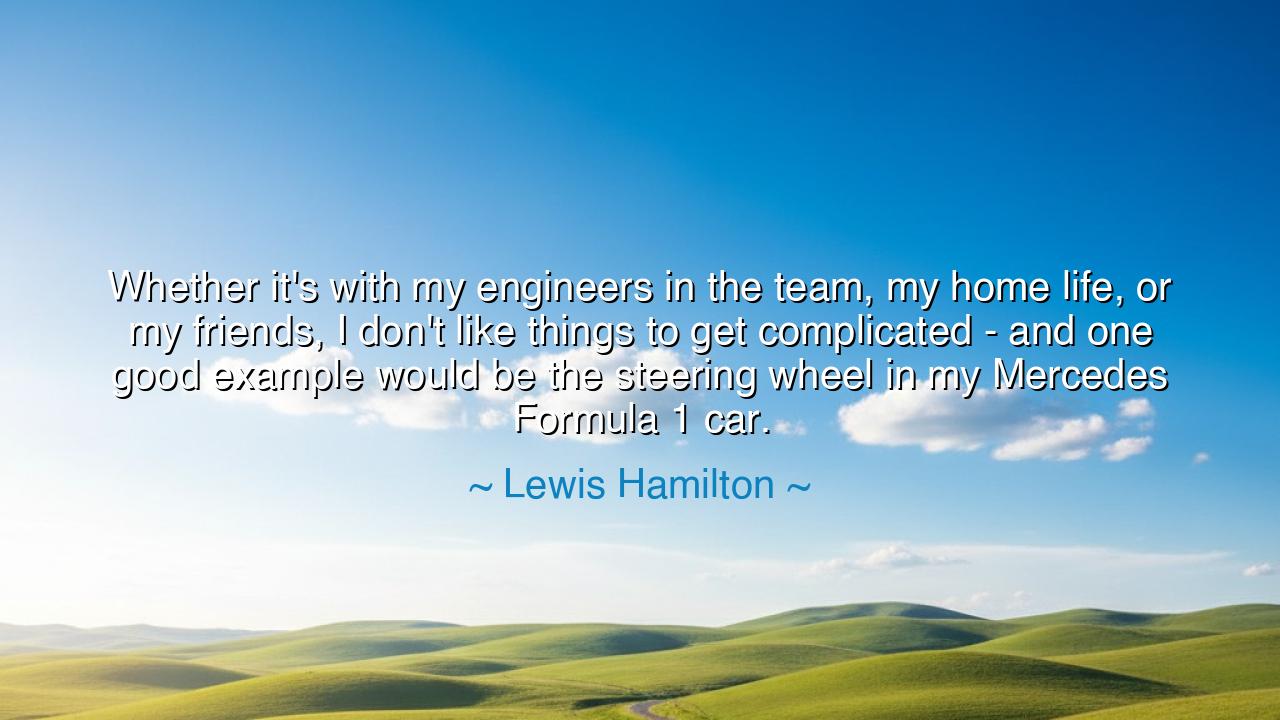
Whether it's with my engineers in the team, my home life, or my
Whether it's with my engineers in the team, my home life, or my friends, I don't like things to get complicated - and one good example would be the steering wheel in my Mercedes Formula 1 car.






The champion Lewis Hamilton once said, “Whether it’s with my engineers in the team, my home life, or my friends, I don’t like things to get complicated — and one good example would be the steering wheel in my Mercedes Formula 1 car.” In these words lies not merely the reflection of a racer, but the philosophy of simplicity — the ancient wisdom that greatness is born not from clutter, but from clarity. Hamilton, a man who commands a machine of unimaginable power and complexity, understands that mastery does not come from adding more, but from refining what matters most. In a world of noise, confusion, and endless details, his words call us back to the sacred art of focus — of finding peace and excellence through simplicity.
The origin of this quote lies in Hamilton’s life as a Formula 1 driver, where every decision, every motion, must balance between precision and chaos. A Formula 1 car is a marvel of engineering — a symphony of buttons, levers, sensors, and speed. Yet even within this technological storm, Hamilton seeks clarity. The steering wheel, the tool through which he commands his car, is both a weapon and a sanctuary. If it is overcomplicated, if it distracts or confuses, victory slips away in a heartbeat. Thus, he strives for simplicity not because life is simple, but because simplicity is the path to control amid complexity. His wisdom mirrors that of ancient warriors who believed that in battle, calmness of mind is the sharpest blade.
This philosophy reaches far beyond the racetrack. To Hamilton, simplicity is not the absence of depth, but the removal of distraction. It is the essence of excellence — the state where nothing unnecessary remains. The samurai called it mushin, the “mind without clutter,” where action and awareness become one. The philosopher Confucius once said, “Life is really simple, but we insist on making it complicated.” Hamilton’s words breathe new life into that truth. Whether with his engineers, family, or friends, he seeks the same purity of connection — communication that is honest, trust that is clear, and relationships that move without friction.
Consider the great inventor Leonardo da Vinci, who said, “Simplicity is the ultimate sophistication.” Though he created intricate designs of machines and art, his genius lay in how each idea flowed naturally, without waste. His notebooks reveal not chaos, but harmony — each line purposeful, each stroke measured. So it is with Hamilton’s philosophy: even in a machine as intricate as his Mercedes, he seeks to make the interface — the point where man meets machine — simple and intuitive. For in simplicity, the human spirit can breathe freely, undistracted by confusion.
The deeper lesson of Hamilton’s quote lies in the balance between complexity and clarity. Life itself, like a Formula 1 race, is fast, demanding, and filled with unseen variables. We cannot always control the storm, but we can control how we navigate it. The wise understand that clarity of thought brings strength, while complexity without purpose breeds chaos. To “not like things to get complicated” is not to flee from difficulty — it is to strip away the unnecessary, to leave only what truly serves the goal. Just as Hamilton trims the noise in his car’s controls, so too must we remove the clutter from our own minds and lives.
There is also a hidden humility in Hamilton’s reflection. He does not claim that he alone masters the car; he acknowledges the partnership between himself and his engineers, his team, his home, and his friends. Each relationship, like each component of the car, must work in harmony. Simplicity is not isolation — it is connection without confusion, strength without ego. In the ancient world, a wise ruler governed not through endless rules, but through clear principles. In the same way, Hamilton shows that true leadership — on the track or in life — means keeping what matters simple and true.
So, my child of the modern age, learn from this teaching: seek simplicity in all things. When your work feels overwhelming, refine it until its purpose is clear. When your relationships feel tangled, return to honesty and listening. When your thoughts grow heavy with doubt, strip them to their essence — what is real, what is needed, what is true. For it is not the complexity of life that defines greatness, but the clarity with which one moves through it.
And when the race of life grows fast and fierce, remember Lewis Hamilton’s wisdom. You cannot slow the world, but you can simplify your path. Keep your mind like his steering wheel — efficient, direct, uncluttered. Let every action have intention, every word have meaning, every relationship have understanding. Then, even amidst the roar of chaos, you will steer with grace — calm, focused, and free.






AAdministratorAdministrator
Welcome, honored guests. Please leave a comment, we will respond soon